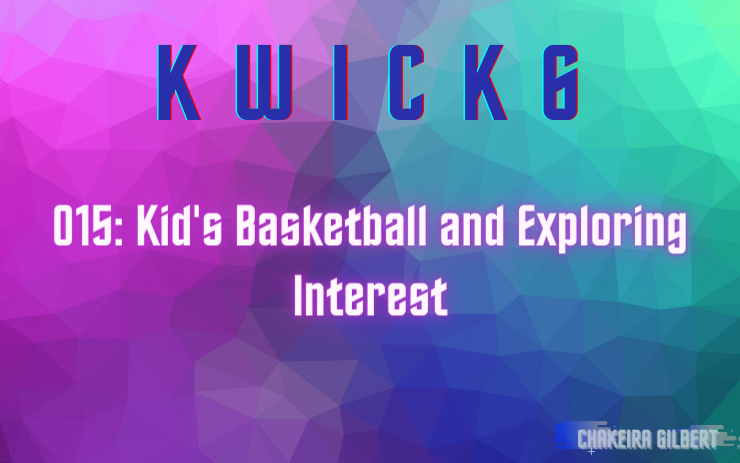KWICK 6: Kid's Basketball and Exploring Interest

🤔 Thought of the Week:
It has been a long time since I've been around basketball. I watch it a lot on TV, but nothing compares to going to a live game, which hasn't happened since last summer. Going to a professional game differs from going to a kid's game. About two weeks ago, I got the opportunity to go to a basketball game for 7 to 9-year-olds and enjoyed the chaos. A couple of coworkers had kids who were playing, so I went to support them. They are still learning the basics and mechanics of basketball at that age. They still have that unfiltered joy of just running around the court trying to remember that dribbling is required even when a defender is on them. Honestly, going to the game reminded me why I still love basketball. Professional basketball lacks the joy and love of the game sometimes. Especially with the NBA, the season is so long and mentally draining that some of the basics (like defense) take a break through a significant portion of the season. Watching the kid's game reminded me of the years of finishing homework and shooting outside until it went dark. It reminded me that starting something new is messy and unorganized, but taking the time to watch and learn is critical to improvement. The journey never ended for me; I always saw ways to get better. The skills learned in basketball have impacted my life in a major way. I may need to revisit the idea of coaching again; I would love to use basketball to impact kids' lives.
💻 What I've Consumed:
Rewatching Documentaries
The last few weeks at work have been a mix of a trickle and a flood of work. So, I needed a little more mental stimulation and watched a couple of documentaries. One documentary I watched was Pray Away. I previously watched this documentary in September 2022, and the abundance of shame stood out to me then. Since I watched the documentary, I have been learning more about how Western Christianity interprets the Bible and what I was taught about it. I have been asking more questions and wrestling with my beliefs. It has become increasingly more challenging to dismiss the harm done to a community in the name of God. I left rewatching this documentary, asking a couple of questions: Why does the Great Commission seem to involve power and not love? Is Christian supremacy the goal? What cultural context did the early church have while writing the New Testament, and what cultural context are we reading into it now?
I also watched a documentary called Born into Synanon and Hell Camp. In 2022, I listened to a podcast about Synanon and watched at least one other documentary. Hell Camp is about a wilderness camp for troubled teens that ended in the death of a teen and abuse for some teens. These two connected for me because Synanon had a teen program, and many of their teachings spurred the "tough love teen programs" in the US. After the cult was essentially disbanded, some of the members started youth programs and used the same tactics. Hell Camp was not one of those programs; however, it grew during the same time period. Teens in the '70s and '80s were viewed as out of control, and tough love was the only way to get them to be a decent part of society. What stands out to me is that views on teens never really change, but the types of trouble they can get into do. Children and teens are in vulnerable positions, and power dynamics can certainly come into play. Often, abuse goes unchecked for so long because who believes the troubled child? Abusers use that to their advantage.
Percy Jack Disney+ Series
I finally started the show, and wow! It is definitely a big step up from the movies. I haven't read the books in a long time, but the show is a pretty good adaptation. The author, Rick Riordan, is involved with writing for the show, and you can tell. Without seeing how the season ends (at this point, only six episodes of the eight planned are available), it will be a hit for old and new fans of the series. This may compel studios to work more closely with creators because there have been some serious flops when the studio doesn't listen. It is a delicate balance to draw adoring fans and introduce new fans. Without the creator, it is much more difficult. I recommend watching it—great age-appropriate tension and storytelling.
📚 Currently Reading:
8% Freedom Is A Constant Struggle: Ferguson Palestine, and the Foundations of a Movement by Angela Davis
I am reading this for the @bookcomuniread book club. This is a collection of Angela Davis's essays, interviews, and speeches. She explores the connected struggles against state violence, oppression, and injustice, focusing on the Black Freedom Movement, Palestine, and prison abolition. I just started this book and have only read the introduction and the first interview. It is a 145-page book, and I should finish in the next week. So far, I think it will be a win for me based on the themes it explores.
5% Leviathan Wakes by James S.A. Corey
The Expanse series is a space opera science fiction that explores a solar system-wide conspiracy. It is a nine-book series that I want to read this year. After I get through some of the books, I want to tackle the TV show. So far, the book has captured my attention, but I understand that because of the novel's length, it will include some differing pace. If done well, I think I can be a big fan.
💡 Lessons Learned:
Here are a few quotes from books and thoughts on them:
"History is dangerous. It forms our identity, our shared story. If someone challenges a sacred myth, the reaction can be ferocious."
Robert E. Lee and Me: A Southerner's Reckoning with the Myth of the Lost Cause by Ty Seidule
I agree, in a sense. History does form who we are, but history is also liberating. Minorities have used history as a power source, drawing strength because if our ancestors fought, we must and can continue the fight.
"I think probably most kids empathize too much at some point in their lives and have to grow out of it, are forced to grow out of it, just to survive, and my character is a person who can’t grow out of it and for whom it is literal."
Octavia E. Butler: The Last Interview and Other Conversations (There Isn't Anything I Can't Do In Science Fiction) by Melville House and Octavia E. Butler
Butler is talking about the main character in The Parable of the Sower. I have not read the book, but Butler effectively communicates the themes she explores. I plan to start digging into her books this year and can't wait to see if empathy is a recurring theme in her work.
If you need some recommendations, check out my Goodreads or StoryGraph. And then follow me on Instagram and Twitter. One of my favorite newsletters to read for current events is Morning Brew. Check it out.

